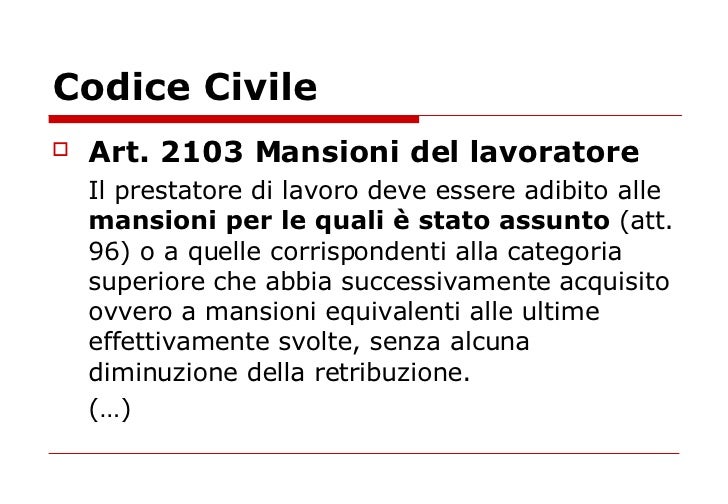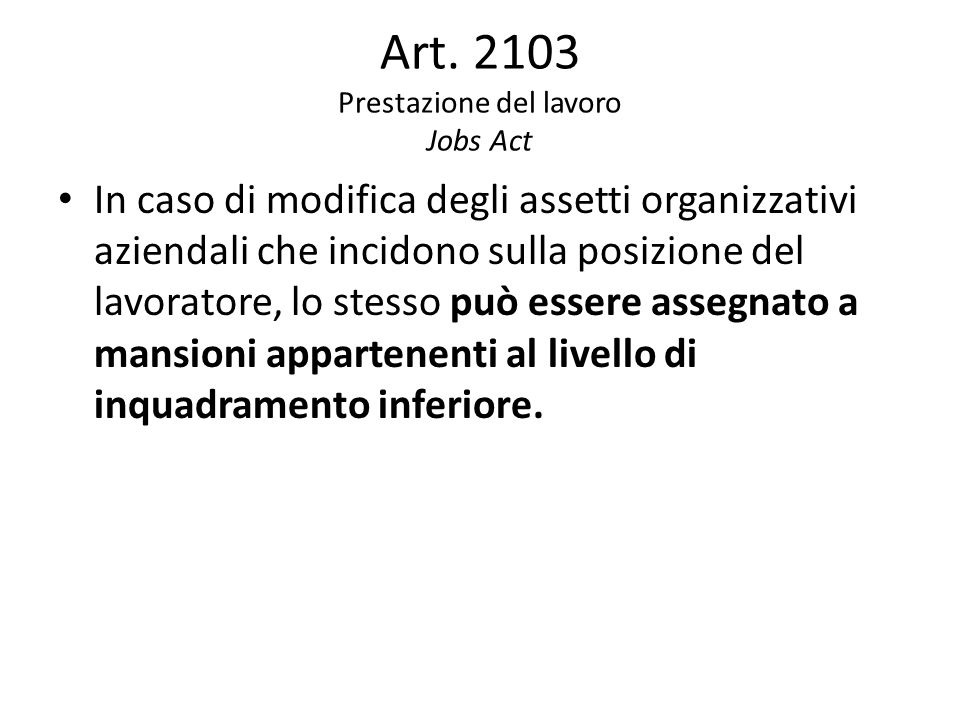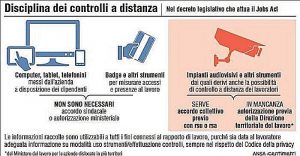
A return to the past is largely reproduced, to a logic according to which that of the entrepreneur is a unilateral power of command. There is no longer the professional protection of the worker, but the simplification in the management of human resources for the employer. The aim is to favor internal mobility, reinforcing the unilateral power of the entrepreneur. “Even in the presence of a minimal non-compliance detected with the control systems, the employer will be able to fire, suffering an almost irrelevant economic penalty”. “A new Workers' Statute is our alternative to the Jobs Act”
Three university professors, labor law experts, examine the reform of the Renzi government. Redundancies, demotion and remote control: what is substantiated is an attempt to amend the material constitution of the country.
Of Fabrizio Ricci 20 November 2015 – review.it

With the Jobs Act, the balance of power within the labor market changes. The balance between fundamental rights, that of work and that of freedom of economic initiative, is changing. In short, although without formal modifications, the material Constitution of the country changes, which is no longer the one built on the conquests of the 70s, but seems to have gone back much further.
It is a very severe analysis, but one that takes on particular value because it is being developed by three "insiders", three labor law professors from different universities, Perugia, Siena and Bologna, called to examine the new legislation introduced by the Renzi government at the 'inside a training seminar, promoted by the CGIL of Umbria in Perugia (the second on the Jobs Act, this was the first). Seminar introduced and coordinated by Giuliana Renelli, CGIL regional secretary, who examined in detail the reform of social safety nets ("a sea of uncertainties") and animated precisely by the interventions of the three "profs" - Stefano Giubboni (University of Perugia), Giovanni Orlandini (University of Siena) and Andrea Lassandari (University of Bologna) – before the conclusions of Corrado Barachetti, responsible for the 'Labour market' of the national CGIL.
Stefano Giubboni: "Emptied the Workers' Statute"
 "The overall structure that emerges from the implementing decrees of the Jobs Act produces a substantial emptying of the constitutional and guarantee dimension of the Workers' Statute". For Professor Stefano Giubboni this is the central node from which to start. The Statute is today "redimensioned to ordinary law", with a consequent retreat of the "power" of the workers, to the full advantage of "the private and command power of the entrepreneur". Law 300/70 had in fact set three fundamental limits that the Jobs Act substantially undermines: a defense of the workers' professionalism; very strict boundaries to the supervisory power and related disciplinary powers of the employer; strong limitations on the power of withdrawal and therefore on dismissals. “These were the pillars of the guarantee and constitutional soul of the Statute – explains Giubboni – which are strongly affected by the reform. We are essentially in the presence of a very clear regulatory design, which largely produces a return to the past, to a logic according to which that of the entrepreneur is a unilateral power of command”.
"The overall structure that emerges from the implementing decrees of the Jobs Act produces a substantial emptying of the constitutional and guarantee dimension of the Workers' Statute". For Professor Stefano Giubboni this is the central node from which to start. The Statute is today "redimensioned to ordinary law", with a consequent retreat of the "power" of the workers, to the full advantage of "the private and command power of the entrepreneur". Law 300/70 had in fact set three fundamental limits that the Jobs Act substantially undermines: a defense of the workers' professionalism; very strict boundaries to the supervisory power and related disciplinary powers of the employer; strong limitations on the power of withdrawal and therefore on dismissals. “These were the pillars of the guarantee and constitutional soul of the Statute – explains Giubboni – which are strongly affected by the reform. We are essentially in the presence of a very clear regulatory design, which largely produces a return to the past, to a logic according to which that of the entrepreneur is a unilateral power of command”.
Giovanni Orlandini: "Demansion, a real change of perspective"
 The modification of article 2103 of the civil code is, together with the contract with increasing protections, one of the key aspects of the Jobs Act, albeit little in the center of media attention. "We are faced with a typical example of a rule conceived as mandatory by the legislator, because it was conceived to reflect and respect a certain balance between constitutional principles, and for this reason removed from the autonomy of the parties, which instead is now distorted", explains Professor Orlandini . Article 13 of the Workers' Statute was born precisely "to substantiate fundamental rights of the worker, such as that of respect and growth of his professionalism (article 35 of the Constitution) and dignity (article 2), in balance with economic freedom". Principles that - according to the professor - are "uprooted" with the new legislation. "Until today - explains Orlandini - the possibility of demotioning, in a strictly constitutional logic, was c
The modification of article 2103 of the civil code is, together with the contract with increasing protections, one of the key aspects of the Jobs Act, albeit little in the center of media attention. "We are faced with a typical example of a rule conceived as mandatory by the legislator, because it was conceived to reflect and respect a certain balance between constitutional principles, and for this reason removed from the autonomy of the parties, which instead is now distorted", explains Professor Orlandini . Article 13 of the Workers' Statute was born precisely "to substantiate fundamental rights of the worker, such as that of respect and growth of his professionalism (article 35 of the Constitution) and dignity (article 2), in balance with economic freedom". Principles that - according to the professor - are "uprooted" with the new legislation. "Until today - explains Orlandini - the possibility of demotioning, in a strictly constitutional logic, was c conditional exclusively on the need to protect other prevailing rights and interests of the worker, and only of the worker, such as, for example, health, maternity, employment protection. Today – continues the professor from the University of Siena – the ratio itself of the law has changed: the focus is no longer on the professional protection of the worker, but on the simplification in the management of human resources for the employer. The aim is to favor internal mobility, reinforcing the unilateral power of the entrepreneur”. "My impression - concludes Orlandini - is that the new article 2103 is a photograph, taken from the point of view of the current legislator, of the change in the material Constitution of the country that is in progress".
conditional exclusively on the need to protect other prevailing rights and interests of the worker, and only of the worker, such as, for example, health, maternity, employment protection. Today – continues the professor from the University of Siena – the ratio itself of the law has changed: the focus is no longer on the professional protection of the worker, but on the simplification in the management of human resources for the employer. The aim is to favor internal mobility, reinforcing the unilateral power of the entrepreneur”. "My impression - concludes Orlandini - is that the new article 2103 is a photograph, taken from the point of view of the current legislator, of the change in the material Constitution of the country that is in progress".
Andrea Lassandari: "Opened a breach in the right to privacy"
The "constitutional crux" comes back and keeps coming back. Because even speaking of remote control – as Professor Lassandari of the University of Bologna does – the constitutional implications are evident, in this case not only on the rights of the worker, but on those of the person in the round. We speak of course  right to privacy, given that the Jobs Act allows the worker to be controlled, without the need for trade union consent, where the latter uses "work tools" provided by the company. "It is easy to understand - observes Lassandari - that, with the technological evolution achieved, it is not difficult for the employer to provide the worker with tools that allow him to meticulously control all the behavior he performs, not only in fulfilling his obligations professional, but also of a strictly personal nature". This opens, according to the professor, a "gap of very important dimensions, with direct consequences also on disciplinary sanctions and on the possibility of dismissal". Possibility that with the contract with increasing protections is, as known, very wide. “Even in the presence of a minimal non-compliance detected with the control systems, the employer will be able to fire, suffering an almost irrelevant economic penalty”. And this, Lassandari points out, if the employer complies with the constraints still envisaged for the collection of information on the worker. But what happens if he doesn't respect them instead? Can the information collected still be used to fire the defaulting worker? "This is not yet clear - concludes Lassandari - complex scenarios are opening up, in a path that, certainly, however, is all uphill for the workers".
right to privacy, given that the Jobs Act allows the worker to be controlled, without the need for trade union consent, where the latter uses "work tools" provided by the company. "It is easy to understand - observes Lassandari - that, with the technological evolution achieved, it is not difficult for the employer to provide the worker with tools that allow him to meticulously control all the behavior he performs, not only in fulfilling his obligations professional, but also of a strictly personal nature". This opens, according to the professor, a "gap of very important dimensions, with direct consequences also on disciplinary sanctions and on the possibility of dismissal". Possibility that with the contract with increasing protections is, as known, very wide. “Even in the presence of a minimal non-compliance detected with the control systems, the employer will be able to fire, suffering an almost irrelevant economic penalty”. And this, Lassandari points out, if the employer complies with the constraints still envisaged for the collection of information on the worker. But what happens if he doesn't respect them instead? Can the information collected still be used to fire the defaulting worker? "This is not yet clear - concludes Lassandari - complex scenarios are opening up, in a path that, certainly, however, is all uphill for the workers".
A new Statute to overcome the Jobs Act
 The dimension of the offensive is therefore very clear. The answer, as far as the CGIL is concerned, is equally so and will soon be presented in detail. “The new Workers' Statute is our alternative to the Jobs Act – explains Corrado Barachetti – a radically different and even abrogative proposal, which in fact represents a sort of referendum on the law wanted by the Renzi government on the matter of Labour. But first of all, we must feel that this new statute is ours to the end, submitting it to the approval of all members, with maximum participation. Only in this way will we be able to have the strength to stop the ongoing process of regression and attack on workers".
The dimension of the offensive is therefore very clear. The answer, as far as the CGIL is concerned, is equally so and will soon be presented in detail. “The new Workers' Statute is our alternative to the Jobs Act – explains Corrado Barachetti – a radically different and even abrogative proposal, which in fact represents a sort of referendum on the law wanted by the Renzi government on the matter of Labour. But first of all, we must feel that this new statute is ours to the end, submitting it to the approval of all members, with maximum participation. Only in this way will we be able to have the strength to stop the ongoing process of regression and attack on workers".
Related articles: CGIL, online site «Now you know» on the Jobs Act
Worker spied with gps? Confirmation of dismissal





